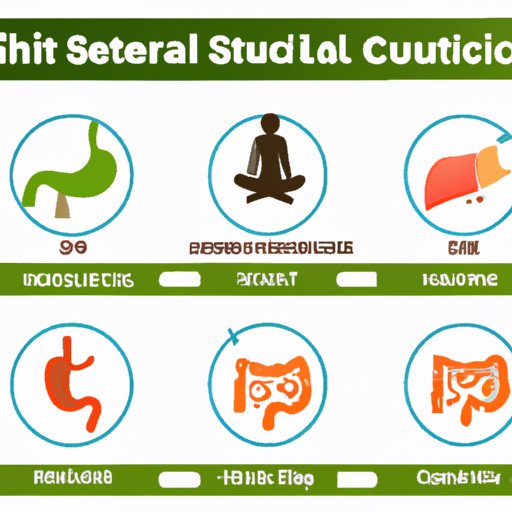
Introduction
Constipation is a common condition that affects millions of people worldwide. It can be caused by a variety of factors, including poor diet, lack of physical activity, and certain medications. However, recent research shows there may be a link between stress and digestive problems, including constipation. In this article, we will explore the connection between stress and constipation, and how understanding this link can help people better manage their digestive health.
Investigating the Science Behind How Stress Impacts the Digestive System
Research shows that the gut is closely connected to the brain and the rest of the body through the gut-brain axis. This connection allows the brain to regulate bowel movements and maintain healthy digestion. Stress can trigger the release of hormones that affect the digestive tract, leading to symptoms like constipation, diarrhea, and stomach pain. Chronic stress can also affect the gut microbiome, the collection of microorganisms that live in the gut and play a crucial role in digestion. When the gut microbiome is imbalanced, it can lead to bowel function issues like constipation.
Connecting Lifestyle Factors to Stress-Induced Constipation
Factors such as a poor diet and a sedentary lifestyle can contribute to digestive problems such as constipation. Stress can exacerbate these issues, making it harder for the body to digest food and move waste through the digestive system. To address stress-induced constipation, people need to take a holistic approach that includes improving their diet and lifestyle habits while also incorporating stress management techniques.
The Role of Stress Management Techniques in Alleviating Constipation
Stress management techniques like meditation, yoga, and deep breathing can have a direct impact on bowel function. One study found that mindfulness meditation led to significant improvement in constipation symptoms among irritable bowel syndrome (IBS) patients. These techniques also improve mental health and lower stress levels, which can further improve digestive health.
Tips for People Suffering from Stress-Induced Constipation
People suffering from stress-induced constipation can take steps to improve their diet and lifestyle to alleviate symptoms. This includes eating a balanced, fiber-rich diet, staying hydrated, and incorporating regular exercise into their routine. Stress management techniques like meditation, yoga, and relaxation exercises can also help reduce stress levels and improve bowel function. It is essential to seek medical help if symptoms persist or worsen.
Survey and Analysis of Stress-Induced Constipation
A survey conducted by the American Gastroenterological Association found that stress is one of the most common triggers for digestive problems, including constipation. The survey also found that people who reported high levels of stress were more likely to experience digestive issues than those who had lower stress levels. The results of this survey highlight the need to address stress as a risk factor for digestive health problems.
Natural Remedies for Stress-Related Constipation
There are several natural remedies that can help alleviate stress-related constipation. Probiotics, which are live bacteria and yeasts that support digestive health, have been shown to improve bowel function in people with chronic constipation. Additionally, fiber supplements like psyllium and flaxseed can improve stool frequency and consistency. However, it is important to consult a doctor before using any natural remedies to avoid adverse effects or interactions with other medications.
Conclusion
Stress can have a significant impact on digestive health, leading to symptoms such as constipation, diarrhea, and stomach pain. Understanding the link between stress and digestive problems can help people take a more comprehensive approach to managing their health. Incorporating stress management techniques like meditation, adopting a healthy diet and lifestyle, and using natural remedies can all help alleviate stress-induced constipation. By taking a proactive approach to gut health, people can improve their overall health and well-being.
Remember, mental health awareness is an essential component of overall health and wellness. By prioritizing stress management and mental health, people can reduce their risk of stress-induced constipation and other digestive health problems.




